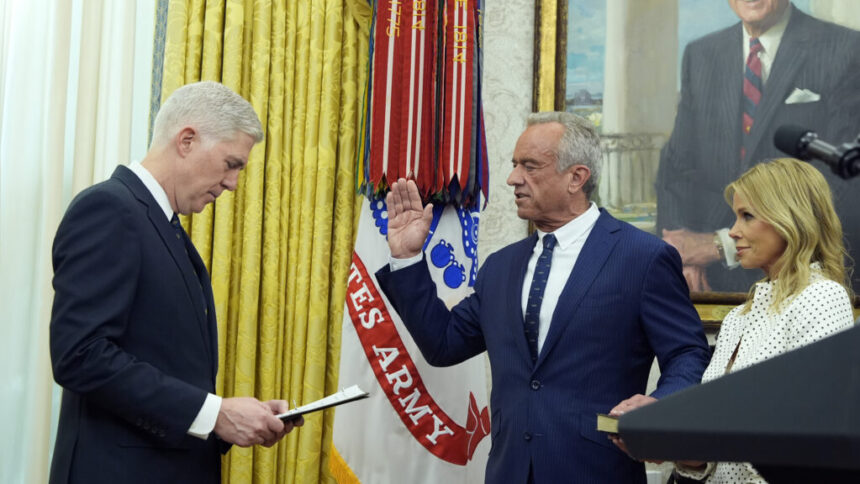Robert F. Kennedy Jr. achieved two major victories on Thursday, solidifying his position as the nation’s health secretary and receiving a presidential endorsement for his “Make America Healthy Again” initiative. The day began with Kennedy being confirmed and sworn in as the health secretary in a ceremony held in the Oval Office, where President Trump hailed his commitment to improving public health. Following the swearing-in, Trump signed an executive order establishing “The President’s Commission to Make America Healthy Again” with Kennedy as the chair. The commission’s primary focus will be investigating the root causes of the rise in childhood chronic illnesses over the past decades and developing an action plan to address the issue.
Kennedy, accompanied by his wife Cheryl Hines and other family members, expressed his determination to challenge existing norms and vested interests to protect the health of American citizens. He highlighted the need for drastic measures to combat institutions that have jeopardized public health. Kennedy also voiced his support for Trump’s stance on foreign aid agency USAID, labeling it as a promoter of totalitarianism and war. He pledged to take similar action against entities that are compromising the health of American children.
The newly formed MAHA commission will comprise federal officials from various departments, including agriculture, education, and health, among others. Kennedy has the authority to invite additional experts and leaders to contribute to the commission’s discussions. The commission’s mandate includes investigating factors contributing to childhood chronic diseases such as diet, toxic exposure, medical treatments, lifestyle, environmental influences, government policies, and corporate influences. The order also mentions the evaluation of the prescription of certain medications and treatments for chronic diseases.
The commission is tasked with delivering an initial assessment of chronic disease prevalence and offering recommendations within 100 days. The subsequent 180-day deadline requires the commission to present a comprehensive strategy to address chronic diseases by recommending effective solutions and reviewing federal funding allocation for disease prevention and treatment. One of the commission’s key focuses will be on the transparency and integrity of research in the field, including evaluating industry-funded projects.
However, there are concerns regarding Kennedy’s approach to scientific questions, particularly his skepticism towards established medical practices like vaccination. Kennedy’s organization, Children’s Health Defense, has long propagated unfounded claims linking vaccines to chronic health conditions, including autism. Despite mainstream scientific consensus debunking these notions, Kennedy remains steadfast in his beliefs. Trump’s decision to entrust Kennedy with addressing the chronic disease epidemic poses a significant challenge requiring collaboration across agencies and a departure from Kennedy’s controversial stances on certain health issues.
Trump’s commitment to establishing a presidential commission to investigate chronic diseases underscores the administration’s focus on public health and the urgency of addressing the nation’s health challenges. With Kennedy at the helm, the MAHA commission faces a daunting task ahead in unraveling the complex web of factors contributing to childhood chronic illnesses and implementing effective solutions to safeguard the health of the American population. Former President Donald Trump announced the formation of a commission aimed at investigating the root causes of chronic health issues. In a video posted on his website last year, Trump emphasized the need for “independent minds who are not bought and paid for by Big Pharma” to lead the commission.
Trump raised questions about the hundreds of billions of dollars spent annually on treating chronic health problems, pointing to potential factors such as diet, environment, and over-prescription of medications. He echoed sentiments expressed by environmental activist Robert F. Kennedy Jr., who has been critical of the pharmaceutical industry’s influence on public health officials.
Presidential commissions have historically been used to investigate disasters and crises, ranging from oil spills to infectious disease outbreaks. Kennedy, who faced scrutiny during confirmation hearings for his past statements on vaccines and other issues, ultimately secured the position with the support of Senate Republicans.
Despite the controversy surrounding Kennedy’s appointment, the commission is poised to delve into the underlying causes of chronic health issues and potentially challenge the status quo in public health policy. The commission’s findings could have far-reaching implications for healthcare and pharmaceutical industries.
This initiative comes at a critical time when the COVID-19 pandemic has highlighted the importance of preventive health measures and addressing underlying health disparities. With a focus on uncovering the root causes of chronic health problems, the commission has the potential to drive significant changes in how we approach healthcare and public health in the future.








